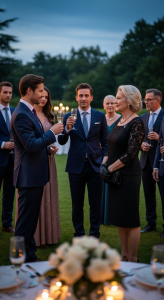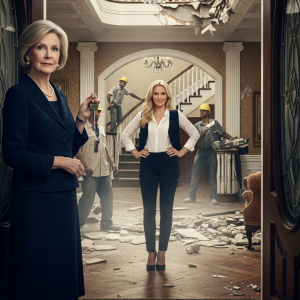The meeting took place on a Tuesday, a day of relentless rain that slicked the windows of Phillip Davies’s corner office. Evelyn Reed, poised and elegant even in the gloom, looked over the final page of the document. It was thick, heavy with the weight of legal jargon and devastating potential. She did not read the words again; she knew them by heart.
Mr. Davies, her family’s trustee and lawyer for three decades, shifted in his leather chair. “Evelyn, are you absolutely certain? This is… final. There is no ambiguity here.” His voice was laced with the gravity of their task.
Evelyn placed the Montblanc pen on the paper but did not yet sign. “Certainty is a luxury, Phillip. What I am is prepared.” She looked out at the rain-streaked cityscape, a kingdom she had built not of glass and steel, but of shrewd decisions and unwavering will. “I pray I never have to make that call. But a lifetime’s work must be protected, not squandered on foolish whims.”
She signed her name, the ink a dark, definitive stroke. “The Geneva Contingency” was now active, a silent, sleeping protocol awaiting a single, coded command. “Let us hope,” she said, closing the folder, “that it remains a testament to planning, and never becomes a tool for cleansing.”
Her concerns had not materialized overnight. They had grown slowly, a collection of small, dissonant observations. Last month, she had visited her son, David, and his wife, Sarah, at their new home. The house itself was an extravagance, but it was the details that had set off alarms. A brand-new German sports car gleamed in the driveway, a defiant silver against the quiet suburban street.
Inside, Sarah had greeted her, a $10,000 handbag hanging from her arm as if it were a casual accessory. “Evelyn! So good to see you! Come in, come in! Can you believe David found this place? It was a steal!” Evelyn knew the market. Nothing in this neighborhood was a “steal.”
Later, her eyes had landed on a stark, minimalist sculpture in their living room. “That’s a beautiful piece, Sarah. Is it new? The artist is notoriously difficult to acquire.”
Sarah had preened, her answer a little too loud, a little too rehearsed. “Oh, David is just incredible! He has connections, you know. He said it was an investment.” Evelyn knew what her son earned as a Vice President at the family company. It was a handsome salary, but it did not support a lifestyle of six-figure cars and investment-grade art.
The probing questions had started a few weeks later. Over their regular Sunday dinner, David had steered the conversation with a clumsy, transparent subtlety. “You know, Mom, Sarah and I were just talking… it’s so important to have everything in order as we get older. A clear power of attorney, making sure your wishes are documented…”
Evelyn had simply stirred her tea, her expression serene. “Everything is in order, David. Phillip Davies has a comprehensive file. You needn’t worry about a thing.” But she noted the flicker of frustration in his eyes, the way his fingers drummed impatiently on the table.
Sarah, of course, played her part with a suffocating, cloying concern. She was always fussing over Evelyn, insisting she sit down, fetching a shawl for a non-existent chill. “Oh, Evelyn, you must be exhausted. You do so much for everyone. You really deserve to just put your feet up and let us handle things for a while.”
The subtext was as thick and cloying as her perfume: You’re old. You’re becoming frail. It’s time for you to step aside and let us take control. Evelyn would smile, thank her for her thoughtfulness, and feel another layer of resolve settle around her heart like ice.

The final piece of the puzzle had been the announcement of the trip to Europe. It was meant to be a gift, a celebration of Evelyn’s 70th birthday. But more than that, it was a test. A final offering of a golden future. She had planned to announce, in the grand hotel overlooking Lake Geneva, David’s promotion to head of the company’s European division—a position of immense power, and the key to a fortune he could earn, not just inherit. She was giving him a kingdom, hoping he was worthy of the crown.
The birthday party was a masterclass in understated elegance. The gardens of Evelyn’s estate were illuminated with soft, golden lights, the scent of night-blooming jasmine mingling with the crisp autumn air. A jazz trio played softly near the French doors, their melodies a sophisticated counterpoint to the gentle clinking of champagne flutes and contented chatter.
Evelyn moved through the crowd, a queen in her court. Her friends, people who had known her for decades, greeted her with genuine warmth and affection. They spoke of shared histories, of business triumphs and personal joys. This was her world, a world built on loyalty, respect, and substance.
David and Sarah worked the room differently. They flitted from group to group, their laughter a little too loud, their smiles a little too bright. David felt a nervous energy thrumming beneath his bespoke suit. This was it. The public setting was perfect. The “joke” would land, planting the seed of the idea in everyone’s mind. It would normalize the conversation, making the eventual move of his mother into a “residence” seem like a natural, even expected, progression. The upcoming Europe trip was the final proof he needed; she was getting sentimental, ready to hand over the reins.
After the cake was served, David tapped a fork against his glass, calling for attention. A hush fell over the garden. He beamed, raising his flute.
“I’d like to propose a toast,” he began, his voice smooth and confident. “To my mother, Evelyn Reed. A woman who is an inspiration to us all. She built an empire from the ground up, and more importantly, she built a family.” He paused, making eye contact with his smiling mother. “She has given us everything… which is why we’ve already given her something in return!”
He let the suspense hang in the air for a beat before delivering the punchline. “We’ve found her the most wonderful, exclusive retirement community! A real five-star place!” He grinned broadly. “I’m kidding! Mostly kidding!”
A wave of awkwardness rippled through the crowd. A few people managed forced, polite chuckles. The jazz trio missed a beat. Most of Evelyn’s oldest friends exchanged sharp, concerned glances. Sarah, standing beside David, held a small, smug smirk on her face. It was the expression of a co-conspirator who believed their clever plan was now in motion.
Evelyn’s smile did not waver. It was a perfect, polished mask, a piece of social armor she had worn and perfected over fifty years in a world run by men. But her eyes, for a split second, turned to chips of flint. She held her son’s gaze, her expression giving nothing away. The warmth, however, was gone, replaced by a deep, abyssal cold.
“Thank you, David. For such a… thoughtful toast,” she said, her voice even and calm. She raised her glass. “To family.”
The guests echoed the toast, the moment of strangeness passing as she gracefully guided the conversation elsewhere. Twenty minutes later, she excused herself. “If you’ll forgive me for a moment. A few last-minute details for our trip to attend to.”
She walked into the house, her steps unhurried and deliberate. She did not retreat from the party; she moved through it with the unshakeable poise of a woman who was not admitting defeat, but walking away to authorize the final, decisive strike.
Inside her mahogany-paneled study, she closed the door, the sounds of the party instantly muted. She sat behind her desk and dialed a single number from memory. It was answered on the first ring.
“Mr. Davies?” she said, her voice low and clear. “Yes. It’s me.”
She paused, looking at a framed photo of a younger, more innocent David on her desk. A flicker of sorrow crossed her face before being replaced by iron resolve.
“Execute Geneva. Effective immediately. Thank you.”
She hung up the phone. She did not sigh. She did not cry. She simply stood, straightened the lapels of her silk jacket, and returned to her party, her smile perfectly, flawlessly, in place.
The collapse did not begin with a bang, but with a quiet, digital notification. The next morning, Sarah was scrolling through her emails while sipping a latte in her sun-drenched kitchen. She saw the subject line—“Your Flight Itinerary Has Been Canceled”—and her heart gave a little jolt of annoyance. She assumed it was a system error.
She opened the email. It was from the airline’s first-class concierge. “We regret to inform you that your booking for two to Paris and Geneva has been canceled, as the corporate payment method used for the purchase has been recalled by the account holder.”
“David!” she shrieked, her voice tight with panic. “David, the airline just emailed. The tickets… the trip is canceled. It says the payment was recalled. Your mother recalled the payment!”
David, still confident, waved it away. “It has to be a mistake. Her assistant probably just mixed something up. I’ll call the office and sort it out.” But the assistant wasn’t available. Nor was the head of accounting. His calls went unreturned.
The second blow fell at lunchtime. David was treating a potential client to an extravagant meal at a Michelin-starred restaurant, a place where the bill often equaled a month’s rent. He felt magnanimous, powerful, already picturing himself as the head of the European division. When the check came, he handed the waiter his exclusive, corporate-issued credit card with a flourish.
A few minutes later, the waiter returned, his expression deeply uncomfortable. “Sir, I’m very sorry, but the card has been declined.”
David felt a hot flush of shame creep up his neck. “That’s impossible. Run it again.”
The waiter nodded and left, only to return with the same answer. “I’m sorry, sir. It was declined again. It says ‘Account Frozen’.”
Excusing himself, David stepped outside and frantically called the private banking line. The voice on the other end was polite, professional, and utterly implacable. “Yes, Mr. Reed. I can confirm your corporate account and the personal trust fund linked to it were frozen by an order from the primary trustee, Mr. Phillip Davies, at 9:00 a.m. this morning.”
The third and final blow arrived late that afternoon. A courier on a motorcycle delivered a crisp, heavy envelope that required a signature. It was from the law firm of Davies, Cromwell & Finch. Sarah tore it open, her hands trembling.
Inside was not a letter from his mother. There was no emotional plea, no angry recrimination. It was a cold, formal notification. David read the words, but his mind struggled to grasp their absolute finality. Certain phrases seemed to leap off the page, seared into his brain.
“…effective immediately, your position on the Board of Directors of Reed Industries has been terminated…”
“…as per the binding codicil known as the Geneva Contingency, all rights of inheritance, both present and future, have been irrevocably rescinded…”
“…your entire designated share of the estate has been legally and permanently redirected to The Evelyn Reed Charitable Foundation for Arts and Education…”
He and Sarah stood in the silent, sun-filled living room, surrounded by the expensive art and designer furniture that was no longer truly theirs. There was no one to yell at, no one to argue with. They had been surgically, silently, and completely excised from the family, their future erased by a single, quiet phone call.
The aftermath was a slow, grinding demolition of their lives. A ‘For Sale’ sign was hammered into the manicured lawn of their home. Creditors, once so eager to extend them lines of credit, began calling at all hours, their voices growing sharper and more demanding with each passing week. The German sports car was repossessed. Sarah’s collection of designer handbags was sold for a fraction of their purchase price.
Their social circle evaporated overnight. The story of David’s toast and its immediate, brutal consequence spread through their community like a virus. Friends who had once clamored for their invitations now crossed the street to avoid them. David was no longer seen as a rising star, the heir apparent to an empire. He was a fool. A greedy, ungrateful son who had committed the ultimate sin: he had underestimated his mother.
He managed to get through to her once. He found her direct number in Geneva, his own phone service soon to be cut off. He pleaded, he apologized, he groveled. He promised he had learned his lesson. He told her he loved her.
Evelyn’s voice on the other end of the line was not angry. It was not sad. It was distant, like a voice from a ship that had already sailed far out to sea. “I’m glad you called, David. It gives me a chance to offer some clarity.”
“This wasn’t about anger,” she continued, her tone as measured as if she were discussing a quarterly report. “It wasn’t about a joke at a party. You presented a significant, long-term risk to the company and to the family legacy. Your behavior demonstrated a profound lack of judgment and character. I simply eliminated the risk.”
There was a pause. “It was a business decision. I do wish you well.” And then the line went dead.
The greatest destruction was psychological. David was left to confront the staggering totality of his miscalculation. He had viewed his mother as a fading matriarch, an emotional creature to be managed and manipulated. He discovered she was a CEO to her very core, a queen who had seen his pathetic coup coming from miles away and had already prepared a swift, merciless checkmate. He had to live with the knowledge that a single, stupid, greedy sentence had cost him everything he had, and everything he ever would have had.
Meanwhile, thousands of miles away, Evelyn sat on the balcony of her suite at the Beau-Rivage hotel in Geneva. The sun was setting over the lake, painting the sky in hues of rose and gold. This was the view she had intended to share with her son as she gifted him a continent.
She was alone now, but she was not lonely. She felt a profound sense of peace, tinged with a melancholy she knew would never fully disappear. The weight of her son’s avarice, a burden she had carried for years, was finally gone.
She raised a glass of wine to the twilight. She wasn’t toasting a victory. She was toasting clarity. The sad, sharp, and liberating clarity of a future she now owned, entirely and completely, by herself.




